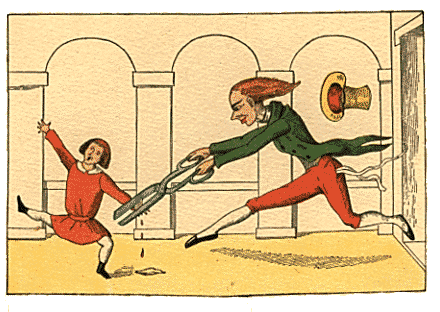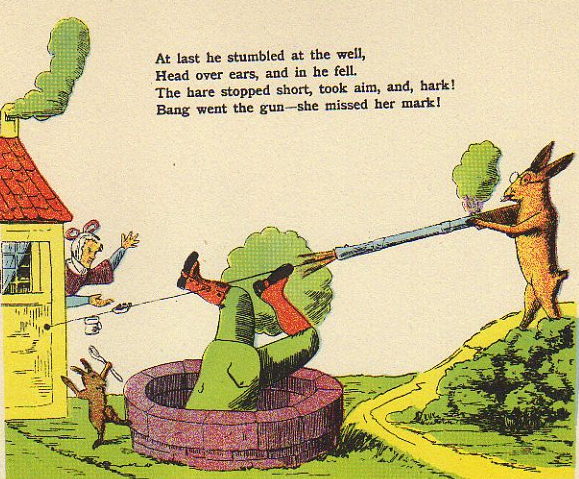Struwwelpeter
Der Struwwelpeter (1845) is a popular German children's book by Heinrich Hoffmann. It comprises ten illustrated and rhymed stories, mostly about children. Each has a clear moral that demonstrates the disastrous consequences of misbehavior in an exaggerated way. The title of the first story provides the title of the whole book. Literally translated, Struwwel-Peter means Shaggy-Peter.
Contents[hide] |
As children's literature scholar Penni Cotton writes, Hoffmann wrote Struwwelpeter in reaction to the lack of good children's books. Intending to buy a picture book as a Christmas present for his three-year-old son, Hoffmann instead wrote and illustrated his own book.[1] Hoffmann was persuaded by friends to publish the book anonymously as Lustige Geschichten und drollige Bilder mit 15 schön kolorierten Tafeln für Kinder von 3–6 Jahren (Funny Stories and Whimsical Pictures with 15 Beautifully Coloured Panels for Children Aged 3 to 6) in 1845. It was not until the third edition in 1858 that the book was published under the title Struwwelpeter. The book became very popular among children throughout Europe, and, writes author and researcher Penni Cotton, the pictures and characters showed a great deal of originality and directness.[1] Struwwelpeter has been translated into several languages. The first English translation appeared in 1848. Mark Twain's English translation of the book is called "Slovenly Peter." A link to an English translation of the entire book is here. In 2006, Fantagraphics Books published the first completely digital version of Struwwelpeter, reinterpreted and illustrated by Bob Staake. Struwwelpeter was republished in English by Dover in 2010.[2] Struwwelpeter describes a boy who does not groom himself properly and is consequently unpopular. In "Die Geschichte vom bösen Friederich" (The Story of Bad Frederick), a violent boy terrorizes animals and people. Eventually he is bitten by a dog, who goes on to eat the boy's sausages while he is bedridden. In "Die gar traurige Geschichte mit dem Feuerzeug" (The Very Sad Story of the Matches), a girl plays with matches and burns to death. In "Die Geschichte von den schwarzen Buben" (The Story of the Black Boys), Nikolas (that is, Saint Nicholas[3]) catches three boys teasing a dark-skinned boy. To teach them a lesson, he dips the three boys in black ink, to make them even darker-skinned than the boy they'd teased. "Die Geschichte von dem wilden Jäger" (The Story of the Wild Huntsman) is the only story not primarily focused on children. In it, a hare steals a hunter's musket and eyeglasses and begins to hunt the hunter. In the ensuing chaos the hare's child is burned by hot coffee. In "Die Geschichte vom Daumenlutscher" (The Story of Thumb-Sucker), a mother warns her son not to suck his thumbs. However, when she goes out of the house he resumes his thumb sucking, until a roving tailor appears and cuts off his thumbs with giant scissors. "Die Geschichte vom Suppen-Kaspar" (The Story of Soup-Kaspar) begins as Kaspar, a healthy, strong boy, proclaims that he will no longer eat his soup. Over the next five days he wastes away and dies. In "Die Geschichte vom Zappel-Philipp" (The Story of Fidgety Philip), a boy who won't sit still at dinner accidentally knocks all of the food onto the floor, to his parents' great displeasure. "Die Geschichte von Hans Guck-in-die-Luft" (The Story of Johnny Head-in-Air) concerns a boy who habitually fails to watch where he's walking. One day he walks into a river; he is soon rescued, but his portfolio drifts away. In "Die Geschichte vom fliegenden Robert" (The Story of Flying Robert), a boy goes outside during a storm. The wind catches his umbrella and sends him to places unknown, and presumably to his doom. Text from http://en.wikipedia.org/wiki/Struwwelpeter To see the entire edition of Struwwelpeter online free - http://www.gutenberg.org/files/12116/12116-h/12116-h.htm[edit]History
[edit]Stories





This is such a great great book! I as very young when my mother gave it to me, in german and still remember!
ReplyDelete